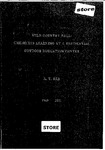Wild Country Hall: Children’s learning at a residential outdoor education centre.
| dc.contributor.supervisor | Kelly, Peter | |
| dc.contributor.author | Rea, Anthony Thomas | |
| dc.contributor.other | Plymouth Institute of Education | en_US |
| dc.date.accessioned | 2011-06-01T14:47:31Z | |
| dc.date.available | 2011-06-01T14:47:31Z | |
| dc.date.issued | 2011 | |
| dc.identifier | 10039618 | en_US |
| dc.identifier.uri | http://hdl.handle.net/10026.1/480 | |
| dc.description.abstract |
This thesis is about learning at a residential outdoor education centre [pseudonym:- Wild County Hall]. It poses and answers three questions: • How useful might discursive positioning be as a perspective on learning? • What are the discourses at Wild Country Hall and how are they different to schooling discourses? • How might neo-Liberal discursive practices, including performativity and current schooling orthodoxies have affected the pedagogic practices at this centre? The review of literature provides an overview of the key literature on outdoor, adventure and experiential learning, considering these through the lenses of learning as acquisition, participation and transformation, before discussing the literature on the discursive positioning of identity. Literature on the discursive practices of outdoor centres is then considered in relation to literature on neo-Liberalism and performativity in schools. The methodology is ethnographic. Participant observations were conducted over a period of five years whilst children were participating in both the organised adventure activities and the residential life of the centre. Searches of the centre’s documentary archives, and follow up interviews with 22 children (aged eight to 11) and three adults were used to add richness to the observational data, and especially to better understand reported participant gains. Analysis was undertaken by coding themes in the data using QSR NVivo N6. The findings suggest that acquisitional and participatory perspectives on learning are not totally adequate for explaining the reported changes in outlook and behaviour of the children who took part in the research. These benefits may be more usefully conceptualised as discursively re-positioned identity. It is suggested that the perspective on learning as discursive positioning may be usefully employed by those studying residential outdoor education in the future. The findings show a number of over-arching discourses that dominate the life of Wild Country Hall. These include place - including the appreciation, care of and respect for nature, the sense of awe and wonder, understanding and protecting the environment – risk, challenge and adventure; and consequent confidence and resilience building by children through facing and over-coming their fears. Whilst some of these fears are linked to the adventure activities of the centre (such as fears of heights, water), other fears are associated with the residential nature of the centre; encountering and coping with homesickness, living with new people, encountering strange customs and unfamiliar social practices. So important were these unfamiliar discourses to the participating children that they may be looked upon as ‘rites of passage’. The findings suggest that encountering unfamiliar discourses may explain the efficacy of learning at Wild Country Hall. Some of the pedagogic practices at Wild Country Hall were found to valorise what may be described as ‘classroom discourses’, and these have tended to formalise learning at the centre. It is suggested, therefore, that this outdoor centre has been influenced by performativity and classroom orthodoxy, themselves shaped by neo-Liberal agenda. These influences may be narrowing the range of discourses available and limiting the centre’s continuing ability to provide unfamiliar discourses, possibly to the detriment of children’s learning. The conclusion makes a number of recommendations for policy practice and research. Recommendations for policy and practice focus on the narrowing tendencies observed at this centre, suggesting shifts in policy to retain the distinctiveness of outdoor education centres. Recommendations for research suggest that follow-up studies would be useful to test the findings in other outdoor centres and other areas of learning, whilst more methodological work could be done on memory and data research sites where contemporaneous notation and digital recording may be difficult or impossible. | en_US |
| dc.language.iso | en | en_US |
| dc.publisher | University of Plymouth | en_US |
| dc.subject | Outdoor learning | en_US |
| dc.subject | Adventure | en_US |
| dc.subject | Identity | en_US |
| dc.subject | Discursive positioning | en_US |
| dc.title | Wild Country Hall: Children’s learning at a residential outdoor education centre. | en_US |
| dc.type | Thesis | |
| dc.identifier.doi | http://dx.doi.org/10.24382/4643 | |
| dc.identifier.doi | http://dx.doi.org/10.24382/4643 |
Files in this item
This item appears in the following Collection(s)
-
01 Research Theses Main Collection
Research Theses Main


